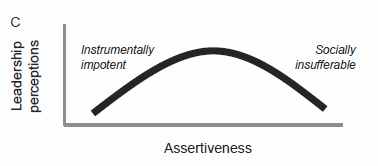Some people believe that being an effective leader is about being tough and taking the hit to your likeability—like a drill sergeant. These sorts of leaders say things like: “It’s not my job to be liked, it’s my job to get things done.”
Others—but probably many fewer—think that being more touchy-feely will boost the positive will towards you and help get things done.
Is there any evidence for either extreme or can you have your cake and eat it?
That’s what Ames & Flynn (2007) tested with 3 groups of MBA students who filled in questionnaires about each other and managers for whom they’d worked. They looked at both social and instrumental outcomes of assertiveness: in other words, how much did people like them and how much did they get things done.
Here’s what they found:
- Productivity: higher and higher levels of assertiveness produced diminishing returns. So in terms of results it’s not much better to be highly assertive than moderately assertive, but it was definitely better to be moderately assertive than not assertive.
- Social outcomes: higher and higher levels of assertiveness lead to increasingly poor social outcomes. It was definitely better to be moderately assertive than highly assertive.
When you put both of the outcomes together you get an inverted U-shape (below; from Ames & Flynn, 2007). So that people who are low in assertiveness get less things done but people very high in assertiveness are socially insufferable.
 In the middle, however, there’s a sweet spot. Whether it’s how leaders dealt with conflict, tried to influence others or motivated their teams, the assertiveness middle ground was clearly the place to be.
In the middle, however, there’s a sweet spot. Whether it’s how leaders dealt with conflict, tried to influence others or motivated their teams, the assertiveness middle ground was clearly the place to be.
And it emerged that assertiveness is vital in how we evaluate co-workers and managers. It may be too little or it may be too much, but workers’ assertiveness was complained about more than other important leadership qualities like intelligence, charisma and conscientiousness.
But when people are moderately assertive, we don’t tend to notice. In the sweet spot assertiveness seems to disappear off our personality judgement radar: if you’re doing it right, no one will notice.
So the tacit belief that you get the best results in business by riding people hard is probably wrong, as is the softly-softly approach. In particular being highly assertive may work in the short-term but in the long-term the productivity gains are small compared with the social damage that’s done.
Image credit: Subharnab Majumdar
